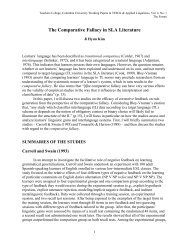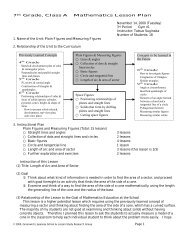UNICEF Mongolia - Teachers College Columbia University
UNICEF Mongolia - Teachers College Columbia University
UNICEF Mongolia - Teachers College Columbia University
You also want an ePaper? Increase the reach of your titles
YUMPU automatically turns print PDFs into web optimized ePapers that Google loves.
CHAPTER 6: TEACHER EFFECTIVENESS<br />
1<br />
2<br />
3<br />
4<br />
5<br />
6<br />
The central level also reviews and approves courses that are submied for the specialized courses. For<br />
the academic year 2010/11, thirty-six (36) organizaons submied a total of 180 training modules; of<br />
those 88 were approved. There is no approval required at the central level for the non-credit courses.<br />
The credit-bearing courses are self-financed and count towards the promoon criteria of teachers. The<br />
Educaon and Culture Department offers mostly non-credit courses. They would be eligible to offer also<br />
credit-bearing courses but, with the excepon of the City Educaon Department, they tend to focus on<br />
non-credit courses.<br />
The idea of life-long learning of teachers, translated into intensive training every five years, existed unl<br />
the early 1990s. It had to be suspended because of the high costs associated with this kind of universal<br />
in-service training of teachers. The MECS Ministerial Order #72 reintroduced this popular provision even<br />
though the budgetary implicaons of this important, yet expensive, in-service teacher training model has<br />
not been resolved to date.<br />
At the city level (Ulaanbaatar), the City Department of Educaon embarked on the basic training provision<br />
for first year and fih year teachers. They are in the midst of implemenng the regulaon. They enrolled,<br />
for example, 92 teachers in history and geography for a 14-day workshop that was organized by MECS.<br />
These basic courses are offered by MECS directly; the City Educaon Department merely coordinates<br />
these centrally administered efforts at the city level.<br />
TEACHERS IN MONGOLIA: AN EMPIRICAL STUDY ON RECRUITMENT INTO TEACHING,<br />
PROFESSIONAL DEVELOPMENT, AND RETENTION OF TEACHERS<br />
94<br />
The main area of acvity at the central level relates to the specialized courses. As menoned above,<br />
MECS has to approve the credit-bearing courses that are typically self-financed by teachers. Each credit<br />
translates into the number of contact hours (an academic contact hour is 45 minutes). Thus, a one-credit<br />
course requires 24 hours (three days) and a two-credit course, 48 hours or three days of aendance.<br />
The credit-bearing courses are typically offered during vacaon or instrucon-free days and cost 9,000<br />
– 15,000 MNT for one credit.<br />
At the school level, the research team analyzed actual in-service training of teachers (N=123) and also<br />
solicited feedback on the current provision of in-service teacher training. Every school is supposed to have<br />
a Teacher Professional Development Plan, administered by the educaon manager. The Plan is supposed<br />
to ensure that teachers have an equal chance of aending school-financed professional development<br />
opportunies. In our qualitave interviews, we asked to see the Teacher Professional Development Plan,<br />
but only few of the schools had such a plan readily available. The research team also garnered feedback<br />
on the current provision of in-service teacher educaon. In general, teachers were enthusiasc about the<br />
intensive workshops offered to teachers every five years. They also believed that school-based training<br />
constuted one of the most effecve ways of quality improvement.<br />
6.4. SUMMARY AND RECOMMENDATIONS<br />
Over the past few years, great aenon has been given to teacher effecveness both in <strong>Mongolia</strong> as<br />
well as internaonally. In an aempt to implement a quality assurance mechanism, a teacher licensing<br />
scheme was introduced (MECS Ministerial Order #74) in 2008. It targeted not only new teachers in the<br />
first two years of their teaching, but also professionals from other fields who switched to the teaching<br />
profession. In addion, it was aimed at teachers who were teaching an addional second or third subject<br />
for which they did not have a license. As a result of this regulaon, “specializaon conversion training




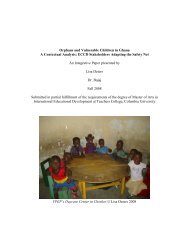
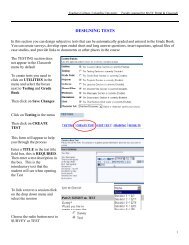
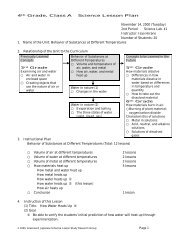
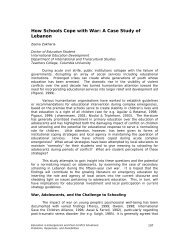


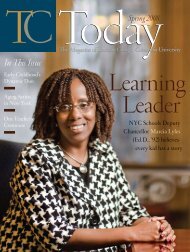


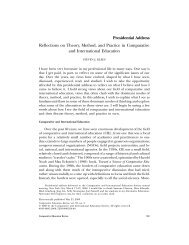
![TC Tod[...].pdf - Teachers College Columbia University](https://img.yumpu.com/27074883/1/190x252/tc-todpdf-teachers-college-columbia-university.jpg?quality=85)

